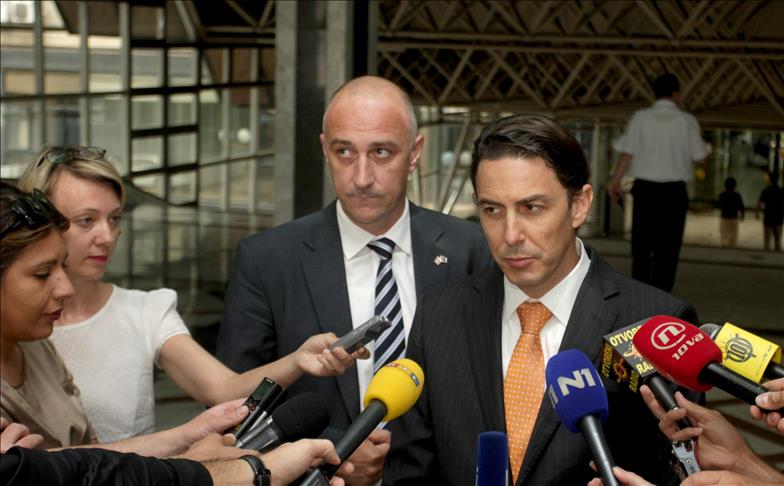While Hezbollah claims it does not seek a full-scale war, it asserts it will not hold back if Israel initiates one.
Senior White House adviser Amos Hochstein said a ‘diplomatic solution’ is needed to end Lebanon-Israel escalation, during his visit to Beirut on Thursday.
“We need to find a diplomatic solution that will allow for the Lebanese people to return to their homes in south Lebanon… as the people of Israel need to be able to return to their homes in their north,” Amos Hochstein told reporters in Beirut.
“We’re living in a crisis moment where we would like to see a diplomatic solution and I believe that both sides prefer a diplomatic solution,” Hochstein said, adding: “It’s our job to get one.”
Following the war in Gaza on October 7, Hezbollah initiated attacks on the Israeli occupation forces’ posts along the border, while also deploying rockets and drones into the northern regions of Israel.
Israel launched a combination of airstrikes and artillery bombardment in southern Lebanon.
Fears in Washington have been heightened by the possibility of Israel’s war in Gaza sparking violence across the region.
On Monday, tensions heightened along the Israel-Lebanon border following an Israeli strike that resulted in the death of Wissam al-Tawil, a senior Hezbollah field commander leading the group’s elite Radwan force.
Subsequently, the clashes persisted as Hezbollah targeted the headquarters of the occupation forces’ northern command with drones, and Israel responded by killing several other field commanders within the group.
Hochstein was anticipated to engage in discussions with acting Lebanese Prime Minister Najib Mikati and other high-ranking Lebanese government and military figures to facilitate talks aimed at restoring tranquillity along the border, a spokesperson from the White House National Security Council told Axios.
Hochstein told the regime’s Prime Minister Benjamin Netanyahu that once the violence ends between Israel and Hezbollah, he intends to initiate indirect talks regarding the land border.
This approach is similar to the negotiations that resulted in the agreement on the maritime border last year, according to Israeli officials, Axios reported.
Earlier this week, during a meeting with UN officials, Mikati said that he had received messages from Israel, conveyed through the U.S. and other countries, warning about the possibility of a war against Lebanon.
“They told us: ‘Do you support the destruction of Lebanon? Do you want what happened in Gaza to happen in Lebanon,'” he said, according to a statement from his office.
Mikati expressed Lebanon’s readiness to engage in talks aimed at achieving enduring stability in southern Lebanon.
“The United States has made clear it does not support the ongoing conflict spreading into Lebanon and continues to exhaust all diplomatic options to see Israeli and Lebanese civilians return to their homes and live in security and stability,” a White House National Security Council spokesperson said.
As of one week ago, more than 76,000 people in Lebanon have been displaced as a result of the battle along the Lebanon-Israel border, the UNOCHA reported on Tuesday.
Cross-border battle
Lebanon’s Hezbollah engaged in cross-border clashes with Israeli occupation forces since the genocide in Gaza erupted more than three months ago, adding to the escalating tensions.
This has raised concerns about the war in Gaza spreading further.
Amos Hochstein, serving as the U.S. energy envoy, had previously suggested the possibility of talks on defining the land border between Lebanon and Israel. In 2022, he played a mediating role in establishing maritime borders between the two countries.
Israeli airstrikes and shelling have killed more than 130 Hezbollah fighters and around two dozen civilians, including children, elderly and several journalists.
While Hezbollah claims it does not seek a full-scale war, it asserts it will not hold back if Israel initiates one.







